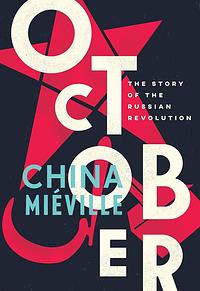Take a photo of a barcode or cover
challenging
informative
reflective
medium-paced
Very informative narrative of the Russian Revolution. A bit more detailed than I needed, but helpful
My first experience of Mieville's writing was The City and The City, which is a great book but very surreal. I wondered how his style would work in this sort of context, when describing events from history. I was pleased by what I found - his story-writing prowess few through, and he managed to paint a picture of a bleak, suffering country with the small strokes of humour you tend to search for in situations where so much is terrible. The book relayed how events played out, but more importantly, it did a good job of evoking a sense of these events being real, of having happened to actual people who would have to live with the aftermath, as well as events themselves. While Mieville admits to his own biases regarding the events presented, one never feels like they're being snuck in under the radar, which is when they would be most problematic, so one feels guided through history, but not tricked into reaching the same conclusions about it.
The author certainly likes to use a lot of million dollar words, and as a lover of language that's fine with me. The fact that reading this on a Kindle allowed me to instantly look up those million dollar words made me even more fine with it.
Language oddities aside, this book is a very good read.
Language oddities aside, this book is a very good read.
informative
slow-paced
dark
informative
tense
medium-paced
This is a useful account of the Russian Revolution that focuses on the major political players in Petrograd. The book divides itself into chapters which highlight important events from February to October 1917. The glossary of names at the end of the book proved indispensable to someone like me who is unfamiliar with the details of the Bolshevik revolution. I especially appreciated the short final chapter reflecting on the meaning of the revolution and how we might understand the implications of this failed, but promising, experiment. The introduction is also a helpful prefatory history to the events described in more detail throughout the bulk of the study. However, I wish there had been a similar glossary devoted to abbreviations and descriptions of the many political factions that played a part in this history. Trying to keep track of the various wings of the parties and organizations proved difficult for me. I was also surprised to see how little information is devoted to Stalin, who clearly plays a major role in the October takeover of the government. Miéville wants to deflect attention away from a narrative that suggests that the pathway from Bolshevism to Leninism to Stalinism is inevitable; however, by nearly ignoring Stalin, I'm left with many questions about how Stalin came to derail the Russian democratic socialist experiment—how did he rise from unassuming bureaucrat and political organizer to one of the People's Commissars in the Bolshevik government.. I would also like to see more attention given to the ways in which Bolshevism was an attractive ideology and movement for the people who eventually sided with and fought for this cause. Finally, the work focuses almost exclusively on events in Petrograd, so I was left wanting to know more about the way the revolution unfolded in other regions of Russia. (Some small consideration is given to Moscow, Baku, and the Ukraine.) Miéville does provide a helpful annotated bibliography to send readers to other sources that appear to fill in the gaps I've just noted. Overall, this is a serviceable introduction to the nine months of unrest that lead up to the revolution, but the day-by-day (sometimes hour-by-hour) account of political and bureaucratic goings struck me as, at times, plodding and partial in scope.
With enormous props to the author who has managed a task of phenomenal complexity this is not an easy, engaging or enjoyable read. The sheer number and variety of factional groups, leaders and splinter groups and their shifting alliances and motivations boggles the mind. What Mieville has achieved is astonishing and my understanding of the events and lives it documents is certainly improved, but I cannot for the life of me recommend that you should submit yourself to the reading of it.
Writing a relatively concise, narrative-driven, ~300 page history of the Russian revolution is a daunting task, and I think Mieville did about as well as he could’ve at the task. Does a relatively good job tracking all the threads, and trying to get the big picture, but as things progress, the literary characterizations go away, and the number of names/committees increases, which sometimes makes it difficult to follow. Again, I think that’s kind of just what you’re going to end up with a book like this. Also was a bit annoyed that Mieville loves using arcane vocabulary, there’s quite a lot of words he uses which have extremely obscure definitions, and oftentimes, there’s an extremely 1:1 alternative. Maybe it’s just a British:American English thing
adventurous
emotional
funny
informative
inspiring
sad
tense
medium-paced
An incredibly well researched and electrically written recounting of the 1917 Russian Revolution. Essiental reading for anyone interested in Russian/Soviet history and the winding and uncertain road to the Bolsheviks seizing power. Of a similar caliber to John Reed's 10 Days That Shook The World, Leon Trotsky's History of The Russian Revolution, Alexander Rabinowich's The Bolsheviks Come to Power. Can't recommend this highly enough, worth every minute put into it and more.
informative
medium-paced




